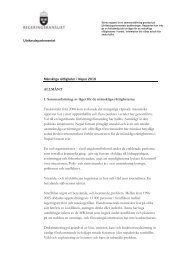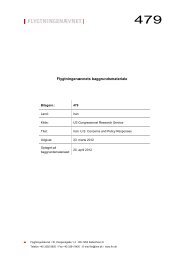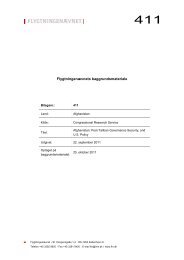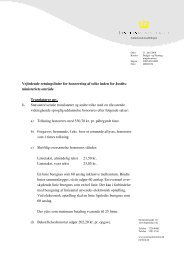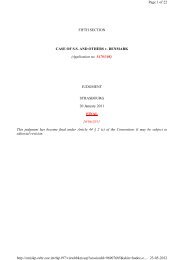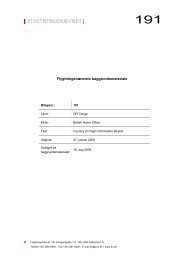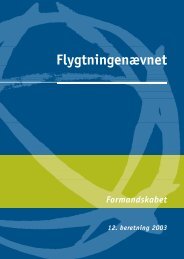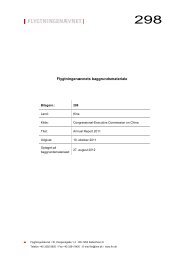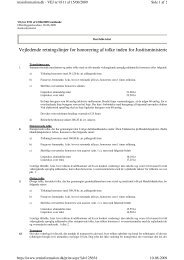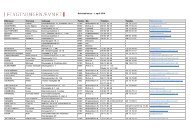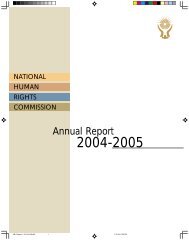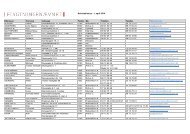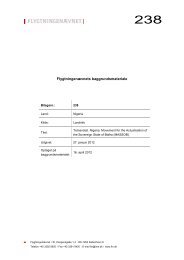2009 Country Reports on Human Rights Practices - The Gambia
2009 Country Reports on Human Rights Practices - The Gambia
2009 Country Reports on Human Rights Practices - The Gambia
Create successful ePaper yourself
Turn your PDF publications into a flip-book with our unique Google optimized e-Paper software.
UNHCR | Refworld | <str<strong>on</strong>g>2009</str<strong>on</strong>g> <str<strong>on</strong>g>Country</str<strong>on</strong>g> <str<strong>on</strong>g>Reports</str<strong>on</strong>g> <strong>on</strong> <strong>Human</strong> <strong>Rights</strong> <strong>Practices</strong> - <strong>The</strong> <strong>Gambia</strong><br />
Title <str<strong>on</strong>g>2009</str<strong>on</strong>g> <str<strong>on</strong>g>Country</str<strong>on</strong>g> <str<strong>on</strong>g>Reports</str<strong>on</strong>g> <strong>on</strong> <strong>Human</strong> <strong>Rights</strong> <strong>Practices</strong> - <strong>The</strong> <strong>Gambia</strong><br />
Publisher United States Department of State<br />
<str<strong>on</strong>g>Country</str<strong>on</strong>g> <strong>Gambia</strong><br />
Publicati<strong>on</strong> Date 11 March 2010<br />
Cite as United States Department of State, <str<strong>on</strong>g>2009</str<strong>on</strong>g> <str<strong>on</strong>g>Country</str<strong>on</strong>g> <str<strong>on</strong>g>Reports</str<strong>on</strong>g> <strong>on</strong> <strong>Human</strong> <strong>Rights</strong><br />
<strong>Practices</strong> - <strong>The</strong> <strong>Gambia</strong>, 11 March 2010, available at:<br />
http://www.unhcr.org/refworld/docid/4b9e52b4c.html [accessed 3 August<br />
2010]<br />
<str<strong>on</strong>g>2009</str<strong>on</strong>g> <str<strong>on</strong>g>Country</str<strong>on</strong>g> <str<strong>on</strong>g>Reports</str<strong>on</strong>g> <strong>on</strong> <strong>Human</strong> <strong>Rights</strong> <strong>Practices</strong> - <strong>The</strong> <strong>Gambia</strong><br />
Bureau of Democracy, <strong>Human</strong> <strong>Rights</strong>, and Labor<br />
March 11, 2010<br />
<strong>The</strong> <strong>Gambia</strong> is a multiparty, democratic republic with an estimated populati<strong>on</strong> of 1.86<br />
milli<strong>on</strong>. In 2006 President Alhaji Yahya Jammeh was reelected for a third five-year term<br />
in an electi<strong>on</strong> c<strong>on</strong>sidered partially free and fair. President Jammeh's party, the Alliance<br />
for Patriotic Reorientati<strong>on</strong> and C<strong>on</strong>structi<strong>on</strong> (APRC), c<strong>on</strong>tinued to dominate the Nati<strong>on</strong>al<br />
Assembly after electi<strong>on</strong>s held in 2007, which were also c<strong>on</strong>sidered partially free and<br />
fair. While civilian authorities generally maintained effective c<strong>on</strong>trol of the security<br />
forces, there were some instances in which elements of the security forces acted<br />
independently.<br />
<strong>Human</strong> rights problems included government complicity in the abducti<strong>on</strong> of citizens;<br />
torture and abuse of detainees and pris<strong>on</strong>ers, including political pris<strong>on</strong>ers; poor pris<strong>on</strong><br />
c<strong>on</strong>diti<strong>on</strong>s; arbitrary arrest and detenti<strong>on</strong> of citizens, including incommunicado<br />
detenti<strong>on</strong>; denial of due process and prol<strong>on</strong>ged pretrial detenti<strong>on</strong>; restricti<strong>on</strong>s <strong>on</strong><br />
freedom of speech and press; violence against women and girls, including female genital<br />
mutilati<strong>on</strong> (FGM); forced child marriage; trafficking in pers<strong>on</strong>s; child prostituti<strong>on</strong>;<br />
discriminati<strong>on</strong> against homosexual activity; and child labor.<br />
RESPECT FOR HUMAN RIGHTS<br />
Secti<strong>on</strong> 1 Respect for the Integrity of the Pers<strong>on</strong>, Including Freedom From:<br />
a. Arbitrary or Unlawful Deprivati<strong>on</strong> of Life<br />
<strong>The</strong>re were no reports that the government or its agents committed arbitrary or<br />
unlawful killings.<br />
In March Dodou Janneh, a police volunteer attached to the nati<strong>on</strong>al drug enforcement<br />
agency, appealed the 2008 death sentence he received for the 2007 killing of Sheriff<br />
Minteh during a police raid in Serrekunda; the appeal was before the courts at year's<br />
end.<br />
On April 3, the joint fact-finding team created by the UN and the Ec<strong>on</strong>omic Community<br />
of West African States (ECOWAS) to investigate the 2005 deaths of more than 50<br />
Ghanaians and other West African nati<strong>on</strong>als in the country submitted a report of its<br />
findings. <strong>The</strong> report stated that "rogue elements" in the security services were<br />
resp<strong>on</strong>sible for the deaths and disappearance of the Ghanaians and recommended that<br />
the government pay compensati<strong>on</strong> to the government of Ghana for the killings and<br />
exhume and return the bodies of six Ghanaians found buried in the Tanji forest. On<br />
http://www.unhcr.org/cgi-bin/texis/vtx/refworld/rwmain?page=printdoc&docid=...<br />
Page 1 of 16<br />
03-08-2010
UNHCR | Refworld | <str<strong>on</strong>g>2009</str<strong>on</strong>g> <str<strong>on</strong>g>Country</str<strong>on</strong>g> <str<strong>on</strong>g>Reports</str<strong>on</strong>g> <strong>on</strong> <strong>Human</strong> <strong>Rights</strong> <strong>Practices</strong> - <strong>The</strong> <strong>Gambia</strong><br />
October 18, the six bodies were returned to Ghana, according to Ghanaian media<br />
reports. While the government did not provide compensati<strong>on</strong>, it paid for exhumati<strong>on</strong> of<br />
the bodies and provided some funds to families of the victims.<br />
b. Disappearance<br />
<strong>The</strong>re were no reports of politically motivated disappearances; however, the<br />
government was complicit in the abducti<strong>on</strong> of citizens suspected of witchcraft.<br />
Between January and June, the BBC carried a series of reports <strong>on</strong> socalled<br />
"witchdoctors" from Guinea, who abducted up to 1,000 villagers in the <strong>Gambia</strong><br />
during the same period, held them for several days, and forced them to drink an herbal<br />
c<strong>on</strong>cocti<strong>on</strong> that resulted in illness and two deaths. <strong>The</strong>re were unc<strong>on</strong>firmed reports that<br />
some villagers were subsequently forced to c<strong>on</strong>fess to being witches. Officials in the<br />
police, army, and the president's pers<strong>on</strong>al protecti<strong>on</strong> guard reportedly accompanied the<br />
Guineans, who were invited into the country after the death of the president's aunt,<br />
which was attributed to witchcraft, according to Amnesty Internati<strong>on</strong>al (AI). <strong>The</strong><br />
Guineans, who were driven around in government vehicles, also c<strong>on</strong>ducted "cleansing<br />
rituals" in several government offices in Banjul, as well as in several other towns and<br />
villages. On May 19, in Brefet, President Jammeh said he had to "bring in witchdoctors<br />
to identify and eradicate witches," who he said were resp<strong>on</strong>sible for underdevelopment<br />
in the districts of F<strong>on</strong>i, according to the governmental newspaper <strong>The</strong> <strong>Gambia</strong> Daily.<br />
During an April 6 address to the Nati<strong>on</strong>al Assembly, the attorney general and justice<br />
minister denied that journalist "Chief" Ebrima Manneh, who was arrested by security<br />
forces in 2006 and subsequently disappeared, was in state custody. This was the<br />
government's first statement regarding the June 2008 ruling by the ECOWAS community<br />
court of justice that Manneh's detenti<strong>on</strong> had been illegal and that the government<br />
should release him and pay compensati<strong>on</strong> of 2.7 milli<strong>on</strong> dalasi ($100,000) to Manneh's<br />
family. <strong>The</strong> ruling followed a lawsuit filed in 2007 by the Media Foundati<strong>on</strong> for West<br />
Africa (MFWA), based in Ghana. In 2007 Manneh was reportedly sighted seeking medical<br />
treatment under police supervisi<strong>on</strong> at a hospital in Banjul, but his whereabouts<br />
remained unknown at year's end.<br />
c. Torture and Other Cruel, Inhuman, or Degrading Treatment or Punishment<br />
<strong>The</strong> c<strong>on</strong>stituti<strong>on</strong> and law prohibit such practices; however, there were reports that<br />
security forces tortured, beat, and mistreated pers<strong>on</strong>s in custody.<br />
<strong>The</strong>re were no developments in the following 2008 cases of security force torture and<br />
abuse: the March stabbing by members of the police interventi<strong>on</strong> unit of Amadou<br />
Sanyang; the June torture and beating of five residents of Lamin Daranka during their<br />
arrest and transfer to Yundum Police Stati<strong>on</strong>; and the torture over an 18-day period in<br />
September by members of the police criminal investigati<strong>on</strong> divisi<strong>on</strong> of Abdoulie Faye.<br />
During his April trial for giving false informati<strong>on</strong> to a public officer, former Nati<strong>on</strong>al<br />
Assembly member Musa Suso alleged that while serving an earlier sentence (from 2000<br />
to 2007), he was denied food and was tied and beaten for three days after a teleph<strong>on</strong>e<br />
calling card was discovered in his cell. On December 11, Suso was acquitted of some of<br />
the charges against him, but he was c<strong>on</strong>victed of others and sentenced to 18 m<strong>on</strong>ths in<br />
pris<strong>on</strong>.<br />
On June 30, the ECOWAS community court heard the case filed by the MFWA against the<br />
government for the 2006 illegal detenti<strong>on</strong> and torture of Musa Saidykhan, the editor in<br />
chief of the Independent newspaper. Saidykhan, who lived abroad in self-imposed exile,<br />
claimed that security forces applied electric shocks to his naked body during his 22-day<br />
detenti<strong>on</strong>; Saidykhan subsequently was released without charge. During the trial, which<br />
was <strong>on</strong>going at year's end, the court's three-member panel rejected the government's<br />
claim that plaintiffs first had to exhaust legal remedies at the nati<strong>on</strong>al level before<br />
appealing to ECOWAS. <strong>The</strong> trial was adjourned until February 2010.<br />
http://www.unhcr.org/cgi-bin/texis/vtx/refworld/rwmain?page=printdoc&docid=...<br />
Page 2 of 16<br />
03-08-2010
UNHCR | Refworld | <str<strong>on</strong>g>2009</str<strong>on</strong>g> <str<strong>on</strong>g>Country</str<strong>on</strong>g> <str<strong>on</strong>g>Reports</str<strong>on</strong>g> <strong>on</strong> <strong>Human</strong> <strong>Rights</strong> <strong>Practices</strong> - <strong>The</strong> <strong>Gambia</strong><br />
<strong>The</strong> indemnity act c<strong>on</strong>tinued to prevent victims from seeking redress in torture cases<br />
related to official acti<strong>on</strong>s taken by military pers<strong>on</strong>nel during military rule from 1994-96.<br />
<strong>The</strong> army requires victims to file formal complaints with the courts regarding alleged<br />
torture that occurred at other times. However, there were no known prosecuti<strong>on</strong>s in<br />
civil or military courts of security force members accused of mistreating individuals<br />
during the year. At the closing cerem<strong>on</strong>y of a civil-military relati<strong>on</strong>s seminar in 2007,<br />
the chief of defense staff publicly announced a zero-tolerance policy for military abuse<br />
of civilians, and some reports indicated such abuse may have declined.<br />
Pris<strong>on</strong> and Detenti<strong>on</strong> Center C<strong>on</strong>diti<strong>on</strong>s<br />
Pris<strong>on</strong> c<strong>on</strong>diti<strong>on</strong>s were poor, and cells were overcrowded, damp, and poorly ventilated.<br />
Inmates complained of poor sanitati<strong>on</strong> and food. Unlike in previous years, there were no<br />
reports that guards were reluctant to intervene in fights between pris<strong>on</strong>ers. Local<br />
pris<strong>on</strong>s were overcrowded, and inmates occasi<strong>on</strong>ally slept <strong>on</strong> the floor; however, prior<br />
to c<strong>on</strong>victi<strong>on</strong>, detainees were allowed to receive outside sources of food.<br />
Pris<strong>on</strong>ers at the Mile 2 Pris<strong>on</strong> died during the year as a result of poor food and<br />
inadequate medical care.<br />
On March 6, Benedict Jammeh, the former police inspector general, testified at Musa<br />
Suso's trial that inmates at Mile 2 Central Pris<strong>on</strong> were fed with meat that resulted in the<br />
deaths of several pris<strong>on</strong>ers; a committee of senior police officers subsequently<br />
c<strong>on</strong>firmed the report. On May 8, David Colley, the director general of pris<strong>on</strong> services,<br />
testified in the same trial that 23 inmates in 2006 and 40 in 2007 died in pris<strong>on</strong>,<br />
primarily as a result of chr<strong>on</strong>ic anemia, abdominal pain, and food pois<strong>on</strong>ing.<br />
Pretrial detainees were occasi<strong>on</strong>ally held together with c<strong>on</strong>victed pris<strong>on</strong>ers. At year's<br />
end, there were 780 inmates in the country's pris<strong>on</strong>s.<br />
<strong>The</strong> government permitted limited independent m<strong>on</strong>itoring of pris<strong>on</strong> c<strong>on</strong>diti<strong>on</strong>s by some<br />
local and internati<strong>on</strong>al human rights groups and diplomatic missi<strong>on</strong>s; however, neither<br />
the media nor the Internati<strong>on</strong>al Committee of the Red Cross (ICRC) was granted access<br />
to detainees or pris<strong>on</strong>ers during the year.<br />
d. Arbitrary Arrest or Detenti<strong>on</strong><br />
<strong>The</strong> c<strong>on</strong>stituti<strong>on</strong> and law prohibit arbitrary arrest and detenti<strong>on</strong>; however, there were<br />
numerous instances of police and security forces arbitrarily arresting and detaining<br />
citizens.<br />
Role of the Police and Security Apparatus<br />
<strong>The</strong> armed forces are resp<strong>on</strong>sible for external defense and report to the minister of<br />
defense, a positi<strong>on</strong> held by the president. <strong>The</strong> police, under the interior minister, are<br />
resp<strong>on</strong>sible for public security. <strong>The</strong> Nati<strong>on</strong>al Intelligence Agency (NIA) is resp<strong>on</strong>sible for<br />
protecting state security, collecting intelligence, and c<strong>on</strong>ducting covert investigati<strong>on</strong>s;<br />
it reports directly to the president. <strong>The</strong> NIA is not authorized to investigate police<br />
abuses, but during the year the NIA often assumed police functi<strong>on</strong>s such as detaining<br />
and questi<strong>on</strong>ing criminal suspects. Security forces frequently were corrupt and<br />
ineffective. On occasi<strong>on</strong> security forces acted with impunity and defied court orders.<br />
<strong>The</strong> police human rights and complaints unit receives and addresses complaints of<br />
human rights abuses committed by police officers from both civilians and other police<br />
officers. During the year the unit received several complaints, and some police officers<br />
faced disciplinary acti<strong>on</strong>s as a result.<br />
Arrest Procedures and Treatment While in Detenti<strong>on</strong><br />
<strong>The</strong> law requires that authorities obtain a warrant before arresting a pers<strong>on</strong>; however,<br />
http://www.unhcr.org/cgi-bin/texis/vtx/refworld/rwmain?page=printdoc&docid=...<br />
Page 3 of 16<br />
03-08-2010
UNHCR | Refworld | <str<strong>on</strong>g>2009</str<strong>on</strong>g> <str<strong>on</strong>g>Country</str<strong>on</strong>g> <str<strong>on</strong>g>Reports</str<strong>on</strong>g> <strong>on</strong> <strong>Human</strong> <strong>Rights</strong> <strong>Practices</strong> - <strong>The</strong> <strong>Gambia</strong><br />
in practice individuals were often arrested without a warrant. Periods of detenti<strong>on</strong><br />
generally ranged from a few to 72 hours, the legal limit after which detainees must be<br />
charged or released; however, there were numerous instances of detenti<strong>on</strong> surpassing<br />
the 72-hour limit. Detainees generally were not promptly informed of charges against<br />
them. <strong>The</strong>re was a functi<strong>on</strong>ing bail system; however, the courts occasi<strong>on</strong>ally released<br />
accused offenders <strong>on</strong> bail <strong>on</strong>ly to have police or other law enforcement pers<strong>on</strong>nel<br />
rearrest them as they were leaving the court. Detainees were not allowed prompt access<br />
to a lawyer or family members; c<strong>on</strong>victed pris<strong>on</strong>ers were generally permitted to meet<br />
privately with their attorneys. Indigent pers<strong>on</strong>s accused of murder or manslaughter were<br />
provided a lawyer at public expense.<br />
Military decrees enacted prior to the adopti<strong>on</strong> of the c<strong>on</strong>stituti<strong>on</strong> give the NIA and the<br />
interior minister broad powers to detain individuals indefinitely without charge "in the<br />
interest of nati<strong>on</strong>al security." <strong>The</strong>se detenti<strong>on</strong> decrees were inc<strong>on</strong>sistent with the<br />
c<strong>on</strong>stituti<strong>on</strong>, but have not been subject to judicial challenge. <strong>The</strong> government claimed<br />
that it no l<strong>on</strong>ger enforced the decrees; however, there were several detenti<strong>on</strong>s during<br />
the year that exceeded the 72-hour limit.<br />
Security forces arbitrarily arrested journalists during the year (see secti<strong>on</strong> 2.a.).<br />
Security forces arbitrarily arrested and detained civilians and members of the military<br />
during the year.<br />
On November 21, security forces arrested former chief of defense Lieutenant General<br />
Lang Tomb<strong>on</strong>g Tamba and six of his close associates and friends. Those arrested were<br />
Brigadier General Omar Bun Mbye, former military director of training and operati<strong>on</strong>s;<br />
Lieutenant Col<strong>on</strong>el Kawsu Camara, commander of the military camp in the president's<br />
home village of Kanilai; Captain Modou Lamin Bo Badjie, former NIA director general;<br />
Commissi<strong>on</strong>er Momodou Gaye, deputy inspector general of police; private businessman<br />
and customs clearing agent Alhaji Kebba Touray; and real estate developer Abdoulie<br />
Joof. All were held without charge bey<strong>on</strong>d the 72-hour limit. Kebba Touray, who was<br />
held at NIA headquarters, was released <strong>on</strong> December 15; however, the other six<br />
detainees remained in Mile 2 Pris<strong>on</strong> without charge at year's end.<br />
On December 30, NIA director Ousman Sowe was fired, arrested, and held<br />
incommunicado for several days. <strong>The</strong>re were reports that he was accused of "delaying a<br />
document of nati<strong>on</strong>al security interest." Sowe was being held without access to his<br />
family or lawyers at year's end.<br />
On January 4, authorities released brothers Lamin Mar<strong>on</strong>g and Ebrima Mar<strong>on</strong>g, who were<br />
arrested in 2008 and held for three m<strong>on</strong>ths without charge.<br />
Bakary Gassama, the former financial director of the NIA, remained in detenti<strong>on</strong> at<br />
year's end. In December 2008 Gassama was released after three m<strong>on</strong>ths in detenti<strong>on</strong> for<br />
alleged abuse of office, but was immediately rearrested.<br />
During the year Gide<strong>on</strong> Adeoye, who was arrested in December 2008 for<br />
allegedly "spreading false informati<strong>on</strong>" about the country's military, was released.<br />
Informati<strong>on</strong> surfaced <strong>on</strong> the incommunicado detenti<strong>on</strong> of four citizens. On June 10,<br />
Kemo C<strong>on</strong>teh, army Staff Sergeant Sam Kambai, NIA officer Kebba Seckan, and<br />
Samsudeen Jammeh were brought before a magistrate in Brikama, al<strong>on</strong>g with 12<br />
Senegalese nati<strong>on</strong>als from the southern Casamance regi<strong>on</strong>; the four citizens had been<br />
held for two to three years incommunicado <strong>on</strong> terrorism charges in an unknown locati<strong>on</strong>.<br />
<strong>The</strong>ir trial, which began <strong>on</strong> August 27, c<strong>on</strong>tinued at year's end.<br />
Two of the detainees held after the disclosure of the 2006 abortive coup plot – Alieu<br />
Lowe, nephew of the fugitive coup leader and Abdoulie Njie – were still being held at<br />
Mile 2 Pris<strong>on</strong> without charge, but their families were allowed access to them during the<br />
year. <strong>The</strong> trial of a third detainee, Hamadi Sowe, who was charged with c<strong>on</strong>cealment of<br />
http://www.unhcr.org/cgi-bin/texis/vtx/refworld/rwmain?page=printdoc&docid=...<br />
Page 4 of 16<br />
03-08-2010
UNHCR | Refworld | <str<strong>on</strong>g>2009</str<strong>on</strong>g> <str<strong>on</strong>g>Country</str<strong>on</strong>g> <str<strong>on</strong>g>Reports</str<strong>on</strong>g> <strong>on</strong> <strong>Human</strong> <strong>Rights</strong> <strong>Practices</strong> - <strong>The</strong> <strong>Gambia</strong><br />
treas<strong>on</strong>, was <strong>on</strong>going at year's end.<br />
Backlogs and inefficiency in the justice system resulted in lengthy pretrial detenti<strong>on</strong>s.<br />
Approximately 30 inmates in the pris<strong>on</strong> system were in pretrial detenti<strong>on</strong>, and some had<br />
been incarcerated for several years awaiting trial. Several l<strong>on</strong>g-term detainees were<br />
released without charge or pard<strong>on</strong>ed during the year.<br />
e. Denial of Fair Public Trial<br />
<strong>The</strong> c<strong>on</strong>stituti<strong>on</strong> and law provide for an independent judiciary; however, the courts,<br />
particularly at the lower levels, were corrupt and subject to executive pressure. AI<br />
noted that the presidential power to remove a judge, nominally in c<strong>on</strong>sultati<strong>on</strong> with the<br />
Judicial Service Commissi<strong>on</strong> (JSC), impeded judicial independence. During the year the<br />
president removed two high court judges without c<strong>on</strong>sulting the JSC.<br />
Judges presiding over "sensitive" cases who made decisi<strong>on</strong>s not c<strong>on</strong>sidered favorable to<br />
the government risked being fired. For example, <strong>on</strong> June 8, the president dismissed<br />
Chief Justice Abdoukarim Savage without explanati<strong>on</strong>. On June 23, the president also<br />
terminated the appointment of Justice Haddy Roche, regarded as an independent<br />
thinker in legal circles; Roche had been dismissed from the bench twice previously.<br />
Several judges were dismissed under similar circumstances in 2008.<br />
Government and security forces often disregarded court orders to release suspects and<br />
rearrested them to provide the prosecuti<strong>on</strong> more time to prepare its case.<br />
<strong>The</strong> judicial system c<strong>on</strong>sists of the Supreme Court, the Court of Appeal, high courts, and<br />
eight magistrate courts. Islamic, or Cadi courts, have jurisdicti<strong>on</strong> over Islamic matters of<br />
marriage, divorce, and inheritance when Muslim parties are involved. District chiefs<br />
preside over local tribunals that administer customary law at the district level. Cadi<br />
courts and district tribunals do not offer standard legal representati<strong>on</strong> to the parties<br />
involved, since lawyers are not trained in Islamic or customary law. Military tribunals<br />
cannot try civilians.<br />
A judicial complaints board, chaired by the chief justice, heard several complaints<br />
during the year; the board deals with administrative, pers<strong>on</strong>nel, and case issues. Board<br />
members included the attorney general, the interior minister, the inspector general of<br />
police, the director general of the NIA, the master of the high court, and the judicial<br />
secretary.<br />
Trial Procedures<br />
<strong>The</strong> c<strong>on</strong>stituti<strong>on</strong> and law provide for a fair and public trial, and the judiciary generally<br />
enforced this right, although frequent delays and missing or unavailable witnesses,<br />
judges, and lawyers often impeded the process. Many cases were also delayed because<br />
of adjournments designed to allow the police or NIA time to c<strong>on</strong>tinue their<br />
investigati<strong>on</strong>s.<br />
Defendants are presumed innocent. Both civilian trials and courts-martial are held in<br />
public, but occasi<strong>on</strong>ally closed-court sessi<strong>on</strong>s are held to protect the identity of a<br />
witness. No juries are used in the civilian courts, but courts-martial proceedings are<br />
presided over by a judge advocate assisted by a panel of senior military officers.<br />
Defendants can c<strong>on</strong>sult with an attorney and have the right to c<strong>on</strong>fr<strong>on</strong>t witnesses and<br />
evidence against them, present witnesses <strong>on</strong> their own behalf, and appeal judgment to<br />
a higher court. Indigent defendants charged with murder or manslaughter have the right<br />
to attorneys provided at public expense. <strong>The</strong> law extends the above rights to all<br />
citizens, and no groups were denied these rights during the year; however, detainees<br />
were rarely informed of their rights or the reas<strong>on</strong>s for their arrest or detenti<strong>on</strong>,<br />
according to AI.<br />
<strong>The</strong> judicial system suffered from inefficiency at all levels. Cases c<strong>on</strong>tinued to be<br />
http://www.unhcr.org/cgi-bin/texis/vtx/refworld/rwmain?page=printdoc&docid=...<br />
Page 5 of 16<br />
03-08-2010
UNHCR | Refworld | <str<strong>on</strong>g>2009</str<strong>on</strong>g> <str<strong>on</strong>g>Country</str<strong>on</strong>g> <str<strong>on</strong>g>Reports</str<strong>on</strong>g> <strong>on</strong> <strong>Human</strong> <strong>Rights</strong> <strong>Practices</strong> - <strong>The</strong> <strong>Gambia</strong><br />
delayed because the court system was overburdened. To alleviate the backlog, the<br />
government c<strong>on</strong>tinued to recruit judges and magistrates from other comm<strong>on</strong>wealth<br />
countries that have similar legal systems. <strong>The</strong> attorney general oversees the hiring of<br />
foreign judges <strong>on</strong> c<strong>on</strong>tract. <strong>The</strong> government reserves the right not to renew a judge's<br />
c<strong>on</strong>tract.<br />
<strong>The</strong> judicial system recognizes customary, Shari'a, and general law. Customary law<br />
covers marriage and divorce for n<strong>on</strong>-Muslims, inheritance, land tenure, tribal and clan<br />
leadership, and other traditi<strong>on</strong>al and social relati<strong>on</strong>s. Shari'a was employed primarily in<br />
Muslim marriage and divorce matters; it favored men in its provisi<strong>on</strong>s. General Law,<br />
following the British model, applied to fel<strong>on</strong>ies and misdemeanors and to the formal<br />
business sector.<br />
Political Pris<strong>on</strong>ers and Detainees<br />
During the year there were credible reports that the government held civilians based <strong>on</strong><br />
their political views or associati<strong>on</strong>s, and some were held incommunicado for prol<strong>on</strong>ged<br />
periods.<br />
United Democratic Party (UDP) supporter Kanyiba Kanyi, who was arrested by men<br />
believed to be state security agents and held without charge shortly before the 2006<br />
presidential electi<strong>on</strong>s, remained in pris<strong>on</strong> at year's end. <strong>The</strong> government has not<br />
permitted access to Kanyi by internati<strong>on</strong>al humanitarian organizati<strong>on</strong>s or his lawyer. In<br />
May 2008 Kanyi's lawyer, who maintained Kanyi was being held by the NIA, filed an<br />
applicati<strong>on</strong> to force the state to comply with the 2006 high court rulings to free him. On<br />
July 29, the judge presiding over the case returned the case file to the office of the<br />
chief justice in an apparent attempt to recuse himself from the trial; the judge provided<br />
no explanati<strong>on</strong> for the return of the case file. Kanyi was reportedly sighted by a relative<br />
in March 2008 at the Royal Victoria Hospital, where he was being escorted by wardens<br />
from Mile 2 Central Pris<strong>on</strong>.<br />
<strong>The</strong> whereabouts of Chief Ebrima Manneh, who was also arrested without charge in<br />
2006, remained unknown at year's end. <strong>The</strong> government denied Manneh was in its<br />
custody.<br />
Civil Judicial Procedures and Remedies<br />
<strong>The</strong> high court has jurisdicti<strong>on</strong> to hear cases for civil and human rights violati<strong>on</strong>s,<br />
although it may decline to exercise its powers if it is satisfied that adequate means of<br />
redress are available under other laws. <strong>The</strong> Indemnity Act c<strong>on</strong>tinued to prevent victims<br />
from seeking redress in some cases.<br />
f. Arbitrary Interference with Privacy, Family, Home, or Corresp<strong>on</strong>dence<br />
<strong>The</strong> c<strong>on</strong>stituti<strong>on</strong> and law prohibit such acti<strong>on</strong>s, but the government did not always<br />
respect these prohibiti<strong>on</strong>s in practice. <strong>The</strong> government did generally enforce Decree 45,<br />
which applies c<strong>on</strong>stituti<strong>on</strong>al safeguards against arbitrary searches and the seizure of<br />
property without due process.<br />
Observers believed the government m<strong>on</strong>itored citizens engaged in activities that it<br />
deemed objecti<strong>on</strong>able.<br />
Secti<strong>on</strong> 2 Respect for Civil Liberties, Including:<br />
a. Freedom of Speech and Press<br />
<strong>The</strong> c<strong>on</strong>stituti<strong>on</strong> and law provide for freedom of speech and of the press; however, the<br />
government limited these rights by intimidati<strong>on</strong>, detenti<strong>on</strong>, and restrictive legislati<strong>on</strong>.<br />
In a July 22 radio interview, President Jammeh warned that journalists who tarnished<br />
the country's image would be "severely dealt with." Although the independent press<br />
http://www.unhcr.org/cgi-bin/texis/vtx/refworld/rwmain?page=printdoc&docid=...<br />
Page 6 of 16<br />
03-08-2010
UNHCR | Refworld | <str<strong>on</strong>g>2009</str<strong>on</strong>g> <str<strong>on</strong>g>Country</str<strong>on</strong>g> <str<strong>on</strong>g>Reports</str<strong>on</strong>g> <strong>on</strong> <strong>Human</strong> <strong>Rights</strong> <strong>Practices</strong> - <strong>The</strong> <strong>Gambia</strong><br />
practiced self-censorship, oppositi<strong>on</strong> views regularly appeared in the independent press,<br />
and there was frequent criticism of the government in the private media.<br />
<strong>The</strong> government published <strong>on</strong>e newspaper, the <strong>Gambia</strong> Daily. <strong>The</strong> privately owned Daily<br />
Observer favored the government in its coverage. <strong>The</strong>re were seven other independent<br />
newspapers, including <strong>on</strong>e published by an oppositi<strong>on</strong> political party that remained<br />
highly critical of the government. <strong>The</strong>re was <strong>on</strong>e independent biweekly magazine.<br />
One government-owned and nine private radio stati<strong>on</strong>s broadcast throughout the<br />
country. During most of the year, the government-owned <strong>Gambia</strong> Radio and Televisi<strong>on</strong><br />
Services (GRTS) gave limited coverage to oppositi<strong>on</strong> activities. GRTS televisi<strong>on</strong><br />
rebroadcast CNN, while local radio stati<strong>on</strong>s rebroadcast the BBC, Radio France<br />
Internati<strong>on</strong>ale, the Voice of America, and other foreign news reports, all of which were<br />
also available via shortwave radio. GRTS televisi<strong>on</strong>, foreign cable, and satellite<br />
televisi<strong>on</strong> channels broadcasting independent news coverage were available in many<br />
parts of the country, and the government allowed unrestricted access to such networks.<br />
<strong>The</strong> deteriorati<strong>on</strong> of the country's media envir<strong>on</strong>ment c<strong>on</strong>tinued during the year. <strong>The</strong><br />
government harassed journalists who wrote articles it c<strong>on</strong>sidered inaccurate and<br />
investigated cases it c<strong>on</strong>sidered sensitive. Several journalists reportedly went into hiding<br />
from fear of government retaliati<strong>on</strong>.<br />
Security forces arbitrarily arrested and detained numerous journalists during the year.<br />
For example, <strong>on</strong> February 2, Pap Saine, co-proprietor and managing editor of the<br />
independent newspaper the Point was arrested and subsequently charged with<br />
publishing false informati<strong>on</strong>; Saine reported <strong>on</strong> the transfer of diplomat Lamin Sabi<br />
Sanyang from NIA headquarters to Mile 2 Pris<strong>on</strong> and <strong>on</strong> the appointment of former<br />
minister Neneh Macdouall-Gaye to an ambassadorship. <strong>The</strong> high court withdrew the<br />
charge <strong>on</strong> July 29.<br />
On March 8, police arrested Halifa Sallah, a former presidential candidate and the<br />
publisher of the newspaper Foroyaa, for allegedly trying to incite people to challenge "a<br />
lawful order of the president to screen witches"; Sallah had criticized the governmentbacked<br />
abducti<strong>on</strong> of alleged witches during the year (see secti<strong>on</strong> 1.b.). On March 19,<br />
the director of public prosecuti<strong>on</strong> announced that all charges were being dropped "in<br />
the interest of peace and justice."<br />
On June 15, seven journalists were arrested for their role in the publicati<strong>on</strong> of a<br />
statement by the <strong>Gambia</strong> Press Uni<strong>on</strong> (GPU) resp<strong>on</strong>ding to remarks by President Jammeh<br />
<strong>on</strong> the 2004 killing of newspaper publisher Deyda Hydara; the GPU characterized the<br />
president's remarks as un-Islamic, inappropriate, and provocative. <strong>The</strong>y added that such<br />
statements would not ex<strong>on</strong>erate the government from involvement in the killing. On<br />
June 18, the court charged the journalists with three counts of sediti<strong>on</strong> and seditious<br />
publicati<strong>on</strong>. On July 27, the court discharged <strong>on</strong>e of the journalists for lack of evidence.<br />
On August 5, the remaining six journalists were c<strong>on</strong>victed <strong>on</strong> all six counts and<br />
sentenced to two years in pris<strong>on</strong> plus a fine of <strong>on</strong>e milli<strong>on</strong> dalasi ($37,037); failure to<br />
pay the fine would result in an additi<strong>on</strong>al two years' impris<strong>on</strong>ment. On September 3, the<br />
six journalists were released following a pard<strong>on</strong> by President Jammeh, who said the<br />
gesture was in h<strong>on</strong>or of the Muslim m<strong>on</strong>th of Ramadan.<br />
On June 22, reporter Augustine Kanjia of the Point newspaper was arrested at Kanifing<br />
court for allegedly taking pictures of the six journalists charged with sediti<strong>on</strong> and<br />
defamati<strong>on</strong>. On June 24, Kanjia was released <strong>on</strong> bail<br />
On August 6, authorities arrested Abdoulie John, the deputy editor in chief and French<br />
language columnist of the progovernment Daily Observer, <strong>on</strong> charges of refusing to<br />
recognize the appointment of a new managing director of the paper; John was released<br />
the same day without charge.<br />
http://www.unhcr.org/cgi-bin/texis/vtx/refworld/rwmain?page=printdoc&docid=...<br />
Page 7 of 16<br />
03-08-2010
UNHCR | Refworld | <str<strong>on</strong>g>2009</str<strong>on</strong>g> <str<strong>on</strong>g>Country</str<strong>on</strong>g> <str<strong>on</strong>g>Reports</str<strong>on</strong>g> <strong>on</strong> <strong>Human</strong> <strong>Rights</strong> <strong>Practices</strong> - <strong>The</strong> <strong>Gambia</strong><br />
<strong>The</strong> trial of Today proprietor and editor Abdul Hamid Adiamoh, arrested in July 2008<br />
following the publicati<strong>on</strong> of a story about school children who skipped classes to salvage<br />
scrap metal, was <strong>on</strong>going at year's end; Hamid Adiamoh was charged with publicati<strong>on</strong><br />
with seditious intent.<br />
Political activist Fatou Jaw Manneh, a foreign-based <strong>Gambia</strong>n journalist who was<br />
c<strong>on</strong>victed in August 2008 <strong>on</strong> sediti<strong>on</strong> charges, departed the country after her family paid<br />
the 250,000 dalasi ($9,260) fine.<br />
Foreign missi<strong>on</strong>aries David and Rachel Fult<strong>on</strong>, who in December 2008 pled guilty in a<br />
magistrate court in Banjul to advocating the violent overthrow of the government,<br />
remained in jail at year's end serving a <strong>on</strong>e-year sentence with hard labor. <strong>The</strong> two also<br />
were fined 250,000 dalasi ($9,260) each, or in default to serve a further 18 m<strong>on</strong>ths in<br />
pris<strong>on</strong>. <strong>The</strong> Fult<strong>on</strong>s had been under surveillance by court order, and were arrested in<br />
November 2008 for publishing "negative articles" and sending "negative letters" about the<br />
country and its government to individuals and organizati<strong>on</strong>s.<br />
Journalist Lamin Fatty of the Independent newspaper, who in 2007 was c<strong>on</strong>victed for<br />
publishing "false news" and fined 50,000 dalasi ($1,850), went into self-imposed exile<br />
early in the year. He appealed his c<strong>on</strong>victi<strong>on</strong>, and the appeal was pending in the courts<br />
at year's end.<br />
In some cases journalists from certain independent newspapers were denied access to<br />
state-sp<strong>on</strong>sored events and press c<strong>on</strong>ferences due to official disapproval of their<br />
editorial stance.<br />
Internet Freedom<br />
<strong>The</strong>re were no government restricti<strong>on</strong>s <strong>on</strong> access to the Internet or reports that the<br />
government m<strong>on</strong>itored e-mail or Internet chat rooms. Individuals and groups could<br />
generally engage in the peaceful expressi<strong>on</strong> of views via the Internet, including by email.<br />
Although many citizens were illiterate and most did not have computers or<br />
Internet c<strong>on</strong>necti<strong>on</strong>s at home, Internet cafes were popular in urban areas. According to<br />
Internati<strong>on</strong>al Telecommunicati<strong>on</strong> Uni<strong>on</strong> statistics for 2008, approximately 6.8 percent of<br />
the country's inhabitants used the Internet.<br />
Academic Freedom and Cultural Events<br />
<strong>The</strong>re were no government restricti<strong>on</strong>s <strong>on</strong> academic freedom or cultural events.<br />
b. Freedom of Peaceful Assembly and Associati<strong>on</strong><br />
<strong>The</strong> c<strong>on</strong>stituti<strong>on</strong> and law provide for freedom of assembly and associati<strong>on</strong>, and the<br />
government generally respected these rights in practice. However, police sometimes<br />
denied or refused to issue permits to oppositi<strong>on</strong> parties wishing to hold political rallies.<br />
<strong>The</strong> oppositi<strong>on</strong> UDP reported that police did not issue permits for a July 26 meeting in<br />
Serrekunda or an August 8 meeting in Bakau; the August 8 meeting was c<strong>on</strong>ducted<br />
without police permissi<strong>on</strong>.<br />
On October 24, Femi Peters, the UDP campaign manager, was arrested after his party<br />
held a rally in Serrekunda without a police permit. On October 26, Peters appeared in<br />
court <strong>on</strong> charges of "c<strong>on</strong>trol of processi<strong>on</strong> and c<strong>on</strong>trol of loudspeakers." Peters refused<br />
to make a plea in the absence of his lawyer, and the case was <strong>on</strong>going at year's end.<br />
c. Freedom of Religi<strong>on</strong><br />
<strong>The</strong> c<strong>on</strong>stituti<strong>on</strong> and law provide for freedom of religi<strong>on</strong>, and the government generally<br />
respected this right in practice.<br />
http://www.unhcr.org/cgi-bin/texis/vtx/refworld/rwmain?page=printdoc&docid=...<br />
Page 8 of 16<br />
03-08-2010
UNHCR | Refworld | <str<strong>on</strong>g>2009</str<strong>on</strong>g> <str<strong>on</strong>g>Country</str<strong>on</strong>g> <str<strong>on</strong>g>Reports</str<strong>on</strong>g> <strong>on</strong> <strong>Human</strong> <strong>Rights</strong> <strong>Practices</strong> - <strong>The</strong> <strong>Gambia</strong><br />
Societal Abuses and Discriminati<strong>on</strong><br />
<strong>The</strong>re were no reports of societal abuse or discriminati<strong>on</strong> based <strong>on</strong> religious affiliati<strong>on</strong>,<br />
belief, or practice.<br />
<strong>The</strong>re was no known Jewish community, and there were no reports of anti-Semitic acts.<br />
For a more detailed discussi<strong>on</strong>, see the <str<strong>on</strong>g>2009</str<strong>on</strong>g> Internati<strong>on</strong>al Religious Freedom Report.<br />
d. Freedom of Movement, Internally Displaced Pers<strong>on</strong>s, Protecti<strong>on</strong> of Refugees, and<br />
Stateless Pers<strong>on</strong>s<br />
<strong>The</strong> c<strong>on</strong>stituti<strong>on</strong> and law provide for freedom of movement within the country, foreign<br />
travel, emigrati<strong>on</strong>, and repatriati<strong>on</strong>, but allow for "reas<strong>on</strong>able restricti<strong>on</strong>s." Restricti<strong>on</strong>s<br />
were imposed <strong>on</strong> foreign travel for many pers<strong>on</strong>s released from detenti<strong>on</strong>, often<br />
because their travel documents were temporarily c<strong>on</strong>fiscated at the time of their arrest<br />
or so<strong>on</strong> afterwards. As a rule, all government employees were required to obtain<br />
permissi<strong>on</strong> from the office of the president before traveling abroad.<br />
<strong>The</strong> government cooperated with the Office of the UN High Commissi<strong>on</strong>er for Refugees<br />
(UNHCR) and other humanitarian organizati<strong>on</strong>s in to internally displaced pers<strong>on</strong>s,<br />
refugees, asylum seekers, stateless pers<strong>on</strong>s, and other pers<strong>on</strong>s of c<strong>on</strong>cern. <strong>The</strong> UNHCR<br />
coordinated government efforts with the Internati<strong>on</strong>al Organizati<strong>on</strong> for Migrati<strong>on</strong>, the<br />
<strong>Gambia</strong> Red Cross Society, and other agencies to provide this protecti<strong>on</strong> and assistance.<br />
<strong>The</strong> law prohibits forced exile, and the government did not use it.<br />
Protecti<strong>on</strong> of Refugees<br />
<strong>The</strong> country is a party to the 1951 C<strong>on</strong>venti<strong>on</strong> Relating to the Status of Refugees and its<br />
1967 Protocol but maintains reservati<strong>on</strong>s <strong>on</strong> clauses regarding a number of refugee<br />
rights, including the right to work. It is also a party to the 1969 African Uni<strong>on</strong><br />
C<strong>on</strong>venti<strong>on</strong> Governing the Specific Aspects of the Refugee Problem in Africa. Neither the<br />
c<strong>on</strong>stituti<strong>on</strong> nor the law provides for the granting of asylum or refugee status, but the<br />
government has established a system for providing such protecti<strong>on</strong> to refugees and<br />
granted refugee status during the year. In practice the government provided protecti<strong>on</strong><br />
against the expulsi<strong>on</strong> or return of refugees to countries where their lives or freedom<br />
would be threatened.<br />
In December 2008, c<strong>on</strong>sistent with internati<strong>on</strong>al agreements, the UNHCR terminated the<br />
refugee status of Sierra Le<strong>on</strong>eans who fled during that country's civil war. During the<br />
year the government and UNHCR provided local integrati<strong>on</strong> opportunities to the<br />
approximately 6,500 Sierra Le<strong>on</strong>eans remaining in the country. <strong>The</strong> government also<br />
facilitated the voluntary repatriati<strong>on</strong> of 27 Liberian refugees.<br />
Approximately 6,200 Senegalese refugees remained in the country during the year,<br />
pending c<strong>on</strong>clusi<strong>on</strong> of the Casamance c<strong>on</strong>flict in Senegal. <strong>The</strong> UNHCR provided<br />
assistance with basic needs and services and implemented livelihoods programs.<br />
Secti<strong>on</strong> 3 Respect for Political <strong>Rights</strong>: <strong>The</strong> Right of Citizens to Change <strong>The</strong>ir<br />
Government<br />
<strong>The</strong> c<strong>on</strong>stituti<strong>on</strong> and law provide citizens the right to change their government<br />
peacefully, and citizens exercised this right in practice through periodic electi<strong>on</strong>s held<br />
<strong>on</strong> the basis of universal suffrage.<br />
Electi<strong>on</strong>s and Political Participati<strong>on</strong><br />
In 2006 Alhaji Yahya Jammeh was reelected for a third term as president, winning<br />
http://www.unhcr.org/cgi-bin/texis/vtx/refworld/rwmain?page=printdoc&docid=...<br />
Page 9 of 16<br />
03-08-2010
UNHCR | Refworld | <str<strong>on</strong>g>2009</str<strong>on</strong>g> <str<strong>on</strong>g>Country</str<strong>on</strong>g> <str<strong>on</strong>g>Reports</str<strong>on</strong>g> <strong>on</strong> <strong>Human</strong> <strong>Rights</strong> <strong>Practices</strong> - <strong>The</strong> Gam...<br />
approximately 67 percent of the vote. <strong>The</strong> main oppositi<strong>on</strong> political party, the UDP,<br />
challenged the electi<strong>on</strong> results; however, the courts upheld the electi<strong>on</strong> results. In the<br />
2007 Nati<strong>on</strong>al Assembly electi<strong>on</strong>s, the ruling APRC w<strong>on</strong> 42 of the 48 elected seats, and<br />
President Jammeh appointed five nominated members, including the speaker. <strong>The</strong><br />
presidential and Nati<strong>on</strong>al Assembly electi<strong>on</strong>s were declared partially free and fair;<br />
irregularities included underage voting, voting by n<strong>on</strong>citizens, and biased media<br />
coverage.<br />
Individuals representing political parties or running as independents could freely declare<br />
their candidacy if their nominati<strong>on</strong>s were approved according to the rules of the<br />
independent electoral commissi<strong>on</strong>.<br />
Political parties generally operated without restricti<strong>on</strong>; however, police sometimes<br />
refused to issue permits for oppositi<strong>on</strong> parties to hold public meetings (see secti<strong>on</strong> 2.b.).<br />
<strong>The</strong>re were four women in the 53-seat Nati<strong>on</strong>al Assembly; two were elected and two<br />
were nominated by the president. At year's end there were five women in the 18member<br />
cabinet, including the vice president.<br />
No statistics were available <strong>on</strong> the percentage of minorities included in the legislature<br />
or the cabinet. However, President Jammeh and many members of his administrati<strong>on</strong><br />
were from the previously marginalized minority Jola ethnic group.<br />
Secti<strong>on</strong> 4 Official Corrupti<strong>on</strong> and Government Transparency<br />
<strong>The</strong> law provides criminal penalties for official corrupti<strong>on</strong>; however, the government did<br />
not implement the law effectively. <strong>The</strong> World Bank's worldwide governance indicators<br />
reflected that corrupti<strong>on</strong> was a serious problem.<br />
<strong>The</strong> president often spoke against corrupti<strong>on</strong>, and leading political and administrative<br />
figures faced harsh sentences <strong>on</strong> charges of corrupti<strong>on</strong> and wr<strong>on</strong>gdoing. <strong>The</strong> financial<br />
intelligence unit, which was established during the year, is resp<strong>on</strong>sible for combating<br />
corrupti<strong>on</strong>.<br />
During the year the government prosecuted some officials accused of corrupti<strong>on</strong>. For<br />
example, <strong>on</strong> November 6, Lieutenant Col<strong>on</strong>el Gibril Bojang, former commander of the<br />
presidential guard, was c<strong>on</strong>victed <strong>on</strong> charges of theft and sentenced to two years'<br />
impris<strong>on</strong>ment and a fine of 1,110,086 dalasis ($41,100). Bojang, who pled as charged,<br />
said the m<strong>on</strong>ey was not used for pers<strong>on</strong>al gain but for the welfare of his unit.<br />
On November 4, six judiciary officials, including judicial secretary Haruna Jaiteh and<br />
high court judges Nguie Mboob-Janneh, Amie Saho-Ceesay, and Saffie Njie were<br />
suspended without pay <strong>on</strong> allegati<strong>on</strong>s of embezzlement of court fines, forfeitures, and<br />
aucti<strong>on</strong>s. <strong>The</strong> officials, who also included junior clerks Pa Modou Njie and Momodou L.<br />
S<strong>on</strong>ko, were charged with embezzlement totaling 4,232,000 dalasis ($157,000). <strong>The</strong> trial<br />
was <strong>on</strong>going at year's end.<br />
Public officials were subject to financial disclosure laws.<br />
<strong>The</strong> c<strong>on</strong>stituti<strong>on</strong> and law do not provide for public access to government informati<strong>on</strong>.<br />
Under the official secrets act, civil servants are not allowed to divulge informati<strong>on</strong><br />
about their departments or to speak to the press without prior clearance from their<br />
department heads.<br />
Secti<strong>on</strong> 5 Governmental Attitude Regarding Internati<strong>on</strong>al and N<strong>on</strong>governmental<br />
Investigati<strong>on</strong> of Alleged Violati<strong>on</strong>s of <strong>Human</strong> <strong>Rights</strong><br />
A number of domestic and internati<strong>on</strong>al human rights groups generally operated without<br />
government restricti<strong>on</strong>, investigating and publishing their findings <strong>on</strong> human rights<br />
cases. Government officials were somewhat cooperative and resp<strong>on</strong>sive to their views.<br />
http://www.unhcr.org/cgi-bin/texis/vtx/refworld/rwmain?page=printdoc&docid=...<br />
Page 10 of 16<br />
03-08-2010
UNHCR | Refworld | <str<strong>on</strong>g>2009</str<strong>on</strong>g> <str<strong>on</strong>g>Country</str<strong>on</strong>g> <str<strong>on</strong>g>Reports</str<strong>on</strong>g> <strong>on</strong> <strong>Human</strong> <strong>Rights</strong> <strong>Practices</strong> - <strong>The</strong> Gam...<br />
Some members of domestic human rights groups reportedly practiced self-censorship in<br />
matters related to the government. Several groups expressed c<strong>on</strong>cern over detainees<br />
held incommunicado, but the government did not resp<strong>on</strong>d.<br />
<strong>The</strong> government allowed visits during the year by the UN and other internati<strong>on</strong>al<br />
governmental organizati<strong>on</strong>s, such as ECOWAS and the comm<strong>on</strong>wealth secretariat;<br />
however, the government offered no resp<strong>on</strong>se to reports issued after the visits. <strong>The</strong><br />
government denied pris<strong>on</strong> access to the ICRC during the year.<br />
<strong>The</strong> office of the ombudsman operated a nati<strong>on</strong>al human rights unit (NHRU) to promote<br />
and protect human rights and to support vulnerable groups. <strong>The</strong> office was established<br />
by the government and receives government funding. During the year the unit received<br />
complaints regarding unlawful dismissals, terminati<strong>on</strong> of employment, unfair treatment,<br />
and illegal arrest and detenti<strong>on</strong>.<br />
Secti<strong>on</strong> 6 Discriminati<strong>on</strong>, Societal Abuses, and Trafficking in Pers<strong>on</strong>s<br />
<strong>The</strong> c<strong>on</strong>stituti<strong>on</strong> prohibits discriminati<strong>on</strong> based <strong>on</strong> race, religi<strong>on</strong>, gender, disability,<br />
language, or social status, and the government generally enforced these prohibiti<strong>on</strong>s.<br />
Women<br />
<strong>The</strong> law prohibits rape, and the government enforced the law effectively, although rape<br />
remained a widespread problem. <strong>The</strong> penalty for rape of an adult is life in pris<strong>on</strong>, and<br />
the maximum penalty for attempted rape is seven years' impris<strong>on</strong>ment. <strong>The</strong> law against<br />
spousal rape was difficult to enforce effectively, as many did not c<strong>on</strong>sider spousal rape a<br />
crime and failed to report it.<br />
Domestic violence, including spousal abuse, was a widespread problem; however, it was<br />
underreported due to the stigma surrounding such violence. <strong>The</strong>re was no law<br />
prohibiting domestic violence; however, cases of domestic violence could be prosecuted<br />
under laws prohibiting rape, spousal rape, and assault. Police generally c<strong>on</strong>sidered<br />
reports of spousal rape to be domestic issues outside of their jurisdicti<strong>on</strong>.<br />
Prostituti<strong>on</strong> is illegal; however, it was a major problem, particularly in tourist areas.<br />
<strong>The</strong> tourism offenses act prohibits sex tourism, which reportedly increased significantly<br />
during the year.<br />
<strong>The</strong> law prohibits sexual harassment and provides for a <strong>on</strong>e-year mandatory pris<strong>on</strong><br />
sentence for offenders; however, sexual harassment occurred.<br />
<strong>The</strong> government did not interfere with the basic right of couples and individuals to<br />
decide freely and resp<strong>on</strong>sibly the number, spacing, and timing of their children, and to<br />
have the informati<strong>on</strong> and means to do so free from discriminati<strong>on</strong>, coerci<strong>on</strong>, and<br />
violence. Couples and individuals had access to c<strong>on</strong>tracepti<strong>on</strong> and skilled attendance<br />
during childbirth, including essential obstetric and postpartum care. Women were<br />
equally diagnosed and treated for sexually transmitted infecti<strong>on</strong>s, including HIV.<br />
During the year the nati<strong>on</strong>al reproductive and child health unit of the department of<br />
health and social welfare c<strong>on</strong>tinued to implement a reproductive health campaign<br />
launched in 2007. <strong>The</strong> campaign, which was funded by the World Health Organizati<strong>on</strong>,<br />
was designed to encourage men to become involved with sexual and reproductive health<br />
issues. All maternal health care services were provided free of charge in government-run<br />
hospitals.<br />
Traditi<strong>on</strong>al views of women's roles resulted in extensive societal discriminati<strong>on</strong> in<br />
educati<strong>on</strong>; however, employment in the formal sector was open to women at the same<br />
salary rates as men. No statutory discriminati<strong>on</strong> existed in other kinds of employment,<br />
access to credit, or owning and managing a business; however, women generally were<br />
employed in such pursuits as food vending or subsistence farming.<br />
http://www.unhcr.org/cgi-bin/texis/vtx/refworld/rwmain?page=printdoc&docid=...<br />
Page 11 of 16<br />
03-08-2010
UNHCR | Refworld | <str<strong>on</strong>g>2009</str<strong>on</strong>g> <str<strong>on</strong>g>Country</str<strong>on</strong>g> <str<strong>on</strong>g>Reports</str<strong>on</strong>g> <strong>on</strong> <strong>Human</strong> <strong>Rights</strong> <strong>Practices</strong> - <strong>The</strong> Gam...<br />
Shari'a law is applied in marriage, divorce, and inheritance issues for Muslims, who make<br />
up more than 90 percent of the populati<strong>on</strong>. Women normally received a lower<br />
proporti<strong>on</strong> of assets distributed through inheritance than males. <strong>The</strong> churches c<strong>on</strong>cerned<br />
and the office of the attorney general settled Christian and civil marriage and divorce<br />
issues.<br />
Marriages often were arranged and, depending <strong>on</strong> the ethnic group, polygyny was<br />
practiced. Women in polygynous uni<strong>on</strong>s had problems with property and other rights<br />
arising from the marriage. <strong>The</strong>y also had the opti<strong>on</strong> to divorce, but no legal right to<br />
disapprove or be notified in advance of subsequent marriages. <strong>The</strong> women's bureau,<br />
under the office of the vice president, oversees programs to ensure the legal rights of<br />
women. Active women's rights groups existed.<br />
Children<br />
Citizenship is derived by birth within the country's territory and from <strong>on</strong>e's parents;<br />
however, not all births were registered. To access health care and treatment at public<br />
health centers, children were required to have a clinic card, which was available<br />
without birth registrati<strong>on</strong>.<br />
<strong>The</strong> c<strong>on</strong>stituti<strong>on</strong> and law mandate free, compulsory primary educati<strong>on</strong> from age six to<br />
12, but the inadequate infrastructure prevented effective compulsory educati<strong>on</strong>, and<br />
children paid fees to attend school. During the year the government estimated that 75<br />
percent of children were enrolled in primary schools. Another 15 percent were enrolled<br />
in the Islamic schools, called "madrassas." Girls c<strong>on</strong>stituted approximately 51 percent of<br />
primary school students and an estimated <strong>on</strong>e-third of high school students. <strong>The</strong><br />
enrollment of girls was low in rural areas, where poverty and cultural factors often led<br />
parents to decide against sending their daughters to school. As part of the government's<br />
<strong>on</strong>going initiative to increase the numbers of girls in school, the government c<strong>on</strong>tinued a<br />
countrywide program to pay basic school fees for all girls; however, in many regi<strong>on</strong>s,<br />
both girls and boys were still required to pay for books, lunch, school fund c<strong>on</strong>tributi<strong>on</strong>s,<br />
and exam fees.<br />
Authorities generally enforced laws when cases of child abuse or mistreatment were<br />
brought to their attenti<strong>on</strong>. Carnal knowledge of a girl under the age of 16 is a fel<strong>on</strong>y<br />
except in the case of marriage, which can be as early as 12 years of age. Incest also is<br />
illegal. Serious cases of abuse and violence against children were subject to criminal<br />
penalties.<br />
On March 21, Anth<strong>on</strong>y Michael Dobs<strong>on</strong>, a 61-year-old New Zealand nati<strong>on</strong>al, was<br />
c<strong>on</strong>victed of child pornography and sentenced to <strong>on</strong>e year in pris<strong>on</strong>. Dobs<strong>on</strong> was<br />
arrested in August 2008 and charged with child pornography and defilement of a girl<br />
under the age of 16; he was acquitted of the defilement charge. His <strong>Gambia</strong>n<br />
accomplice, who was standing trial for procurement, was acquitted.<br />
Peter Paul Hornberger, a German nati<strong>on</strong>al who was arrested in November 2008<br />
for "indecent assault" of an 11-year-old boy, remained in pris<strong>on</strong> awaiting sentencing at<br />
year's end.<br />
<strong>The</strong> law does not prohibit FGM, and the practice remained widespread. Between 60 and<br />
90 percent of women have underg<strong>on</strong>e FGM, and seven of the nine major ethnic groups<br />
reportedly practiced it at ages varying from shortly after birth until age 16. FGM was<br />
less frequent am<strong>on</strong>g the educated and urban groups. Some religious leaders publicly<br />
defended the practice. <strong>The</strong>re were unc<strong>on</strong>firmed reports of health complicati<strong>on</strong>s,<br />
including deaths, associated with FGM; however, no accurate statistics were available.<br />
Several NGOs c<strong>on</strong>ducted public educati<strong>on</strong> programs to discourage the practice and spoke<br />
out against FGM in the media.<br />
On September 29, more than 30 Nati<strong>on</strong>al Assembly members attended a seminar<br />
organized by the NGO <strong>Gambia</strong> Committee <strong>on</strong> Traditi<strong>on</strong>al <strong>Practices</strong> Affecting the Health<br />
of Women and Children (GAMCOTRAP) <strong>on</strong> the harmful effects of FGM. GAMCOTRAP said<br />
http://www.unhcr.org/cgi-bin/texis/vtx/refworld/rwmain?page=printdoc&docid=...<br />
Page 12 of 16<br />
03-08-2010
UNHCR | Refworld | <str<strong>on</strong>g>2009</str<strong>on</strong>g> <str<strong>on</strong>g>Country</str<strong>on</strong>g> <str<strong>on</strong>g>Reports</str<strong>on</strong>g> <strong>on</strong> <strong>Human</strong> <strong>Rights</strong> <strong>Practices</strong> - <strong>The</strong> Gam...<br />
it was campaigning for a law banning FGM.<br />
In May Vice President Isatou Njie-Saidy chaired an internati<strong>on</strong>al c<strong>on</strong>ference calling for an<br />
end to FGM.<br />
<strong>The</strong>re are no laws against forced marriage, and in many villages, especially Bajakunda,<br />
young girls were forced to marry at a young age.<br />
Children in prostituti<strong>on</strong> worked in some brothels, often to support their families or<br />
because they were orphans. Some NGOs also believed that tourists living in remote<br />
guesthouses and motels were involved in the sexual exploitati<strong>on</strong> of children. Security<br />
forces in the tourism development area were required to turn away all minors who<br />
approached the main resort areas without a genuine reas<strong>on</strong>, although they seldom<br />
turned away such children.<br />
Trafficking in Pers<strong>on</strong>s<br />
<strong>The</strong> law prohibits trafficking in pers<strong>on</strong>s for all purposes; however, pers<strong>on</strong>s were<br />
trafficked to, from, through, and within the country. <strong>The</strong> government c<strong>on</strong>sidered<br />
trafficking to be a serious problem.<br />
Due to its porous borders, the country was a destinati<strong>on</strong> for victims internati<strong>on</strong>ally<br />
trafficked from West African countries, mainly Senegal, Sierra Le<strong>on</strong>e, Liberia, Ghana,<br />
Nigeria, Guinea Bissau, Guinea, and Benin. Trafficking victims often were found in the<br />
greater Banjul area and were used as street sellers, domestics, and sex workers. <strong>The</strong><br />
country was also a point of origin and transit for West African trafficking victims<br />
destined for Europe.<br />
<strong>The</strong> penalty for trafficking in children under the age of 18 is life in pris<strong>on</strong>. Enforcement<br />
of the children's act is the resp<strong>on</strong>sibility of the various security services. <strong>The</strong> tourism<br />
security unit, a unit of the nati<strong>on</strong>al army created specifically to enhance security in the<br />
tourism sector, is resp<strong>on</strong>sible for keeping minors out of resort areas. <strong>The</strong> minimum<br />
pris<strong>on</strong> term for trafficking an adult is 15 years; a substantial m<strong>on</strong>etary fine may also be<br />
imposed.<br />
While the government had no established victim care and health facilities for trafficked<br />
pers<strong>on</strong>s, the Department of Health and Social Welfare provided temporary shelter and<br />
access to medical and psychological services to reported victims of trafficking.<br />
<strong>The</strong> government's trafficking taskforce, which included representatives from government<br />
agencies, the UN Children's Fund, the Nati<strong>on</strong>al Assembly, and the NGO Child Protecti<strong>on</strong><br />
Alliance finalized a nati<strong>on</strong>al acti<strong>on</strong> plan for combating trafficking in pers<strong>on</strong>s in<br />
December 2008.<br />
<strong>The</strong> Trafficking in Pers<strong>on</strong>s Act provides for a nati<strong>on</strong>al antitrafficking agency; however, it<br />
had not been established by year's end. A dedicated officer for trafficking issues<br />
c<strong>on</strong>tinued to operate at the Department of Justice, and the Department of Health and<br />
Social Welfare maintained a trafficking divisi<strong>on</strong>. NGOs were active in raising awareness<br />
about trafficking.<br />
See also the State Department's annual Trafficking in Pers<strong>on</strong>s Report.<br />
Pers<strong>on</strong>s with Disabilities<br />
Although the c<strong>on</strong>stituti<strong>on</strong> protects pers<strong>on</strong>s with disabilities against exploitati<strong>on</strong> and<br />
discriminati<strong>on</strong>, no government agency is directly resp<strong>on</strong>sible for protecting pers<strong>on</strong>s with<br />
disabilities. <strong>The</strong> Department of Health and Social Welfare dealt mainly with supplying<br />
some pers<strong>on</strong>s with disabilities with wheelchairs received from internati<strong>on</strong>al d<strong>on</strong>ors.<br />
<strong>The</strong>re was some societal discriminati<strong>on</strong>. Pers<strong>on</strong>s with severe disabilities subsisted<br />
primarily through private charity. Pers<strong>on</strong>s with less severe disabilities were accepted<br />
http://www.unhcr.org/cgi-bin/texis/vtx/refworld/rwmain?page=printdoc&docid=...<br />
Page 13 of 16<br />
03-08-2010
UNHCR | Refworld | <str<strong>on</strong>g>2009</str<strong>on</strong>g> <str<strong>on</strong>g>Country</str<strong>on</strong>g> <str<strong>on</strong>g>Reports</str<strong>on</strong>g> <strong>on</strong> <strong>Human</strong> <strong>Rights</strong> <strong>Practices</strong> - <strong>The</strong> Gam...<br />
fully in society, and they encountered little discriminati<strong>on</strong> in employment for which they<br />
were physically capable. <strong>The</strong>re were no laws to ensure access to buildings for pers<strong>on</strong>s<br />
with disabilities, and very few buildings in the country were accessible to them.<br />
<strong>The</strong> government c<strong>on</strong>tinued to remove many pers<strong>on</strong>s with disabilities from the streets in<br />
an effort to end street begging, which it viewed as a public nuisance. Leaders of the<br />
<strong>Gambia</strong> Federati<strong>on</strong> of the Disabled urged authorities to review their policy regarding<br />
pers<strong>on</strong>s with disabilities. <strong>The</strong>y were instrumental in obtaining the release of several<br />
detained beggars with disabilities.<br />
<strong>The</strong> media c<strong>on</strong>tinued to report <strong>on</strong> the rights of pers<strong>on</strong>s with disabilities, and several<br />
NGOs sought to improve awareness of these rights, including by encouraging the<br />
participati<strong>on</strong> of pers<strong>on</strong>s with disabilities in sports and physical activities. <strong>The</strong> NHRU<br />
specifically sought to promote the rights of women with disabilities. Pers<strong>on</strong>s with<br />
disabilities were given priority access to polling booths <strong>on</strong> voting day.<br />
Societal Abuses, Discriminati<strong>on</strong>, and Acts of Violence Based <strong>on</strong> Sexual Orientati<strong>on</strong> and<br />
Gender Identity<br />
<strong>The</strong> law establishes pris<strong>on</strong> terms ranging from five to 14 years for any male that commits<br />
in public or private any act of gross indecency, procures another male, or has actual<br />
sexual c<strong>on</strong>tact with another male; however, to date, no <strong>on</strong>e has been prosecuted. Many<br />
citizens shunned lesbian, gay, bisexual, and transgender (LGBT) individuals.<br />
In a March 27 speech before the Nati<strong>on</strong>al Assembly, President Jammeh called<br />
homosexual c<strong>on</strong>duct "strange behavior that even God will not tolerate." <strong>The</strong> president<br />
previously described homosexual c<strong>on</strong>duct as a criminal practice and told police to arrest<br />
pers<strong>on</strong>s practicing homosexual activity and to close motels and hotels that<br />
accommodated them. In May 2008 the president ordered all LGBT pers<strong>on</strong>s to leave the<br />
country within 24 hours and threatened to cut off their heads. <strong>The</strong>re were no LGBT<br />
organizati<strong>on</strong>s in the country.<br />
Other Societal Violence or Discriminati<strong>on</strong><br />
Societal discriminati<strong>on</strong> against pers<strong>on</strong>s infected with HIV/AIDS hindered disclosure and<br />
resulted in rejecti<strong>on</strong> by partners and relatives. <strong>The</strong> government took a multisectoral<br />
approach to fighting HIV/AIDS through its nati<strong>on</strong>al strategic plan, which provides for<br />
care, treatment, and support to pers<strong>on</strong>s living with, or affected by HIV/AIDS. <strong>The</strong> plan<br />
also protects the rights of those at risk of infecti<strong>on</strong>. In 2007 the nati<strong>on</strong>al AIDS secretariat<br />
collaborated with the Chamber of Commerce and Industry to develop a business<br />
coaliti<strong>on</strong> resp<strong>on</strong>se to HIV/AIDS, using workplace policies to destigmatize it and allow<br />
workers to feel comfortable seeking informati<strong>on</strong>. Public discourse about HIV/AIDS was<br />
<strong>on</strong>going during the year as President Jammeh c<strong>on</strong>tinued his c<strong>on</strong>troversial herbal<br />
treatment program for the virus. Throughout the year the Ministry of Health urged<br />
pers<strong>on</strong>s to undergo voluntary HIV/AIDS counseling and testing.<br />
Secti<strong>on</strong> 7 Worker <strong>Rights</strong><br />
a. <strong>The</strong> Right of Associati<strong>on</strong><br />
<strong>The</strong> law provides that workers are free to form associati<strong>on</strong>s, including trade uni<strong>on</strong>s,<br />
without previous authorizati<strong>on</strong> or excessive requirements, and workers exercised this<br />
right in practice. Military pers<strong>on</strong>nel and police officers, as well as other civil service<br />
employees, were prohibited from forming uni<strong>on</strong>s. Uni<strong>on</strong>s must register to be recognized,<br />
but there were no cases in which registrati<strong>on</strong> was denied to a uni<strong>on</strong> that applied.<br />
Approximately 20 percent of the work force was employed in the modern wage sector,<br />
where uni<strong>on</strong>s were most active.<br />
<strong>The</strong> government interfered with uni<strong>on</strong>s' right to strike. <strong>The</strong> law allows for the right to<br />
strike, but it places restricti<strong>on</strong>s <strong>on</strong> the right by requiring uni<strong>on</strong>s to give the<br />
http://www.unhcr.org/cgi-bin/texis/vtx/refworld/rwmain?page=printdoc&docid=...<br />
Page 14 of 16<br />
03-08-2010
UNHCR | Refworld | <str<strong>on</strong>g>2009</str<strong>on</strong>g> <str<strong>on</strong>g>Country</str<strong>on</strong>g> <str<strong>on</strong>g>Reports</str<strong>on</strong>g> <strong>on</strong> <strong>Human</strong> <strong>Rights</strong> <strong>Practices</strong> - <strong>The</strong> Gam...<br />
commissi<strong>on</strong>er of labor 14 days written notice before beginning an industrial acti<strong>on</strong> (28<br />
days for essential services). <strong>The</strong> law specifically prohibits military pers<strong>on</strong>nel, police<br />
officers, and other civil service employees, from striking. Police and military pers<strong>on</strong>nel<br />
had access to a complaints unit, and civil servants could take their complaints to the<br />
public service commissi<strong>on</strong> or the pers<strong>on</strong>nel management office.<br />
b. <strong>The</strong> Right to Organize and Bargain Collectively<br />
<strong>The</strong> law permits uni<strong>on</strong>s to c<strong>on</strong>duct their activities without interference. Uni<strong>on</strong>s were<br />
able to negotiate without government interference; however, in practice they lacked<br />
experience, organizati<strong>on</strong>, and professi<strong>on</strong>alism and often turned to the government for<br />
assistance in negotiati<strong>on</strong>s. <strong>The</strong> law allows workers to organize and bargain collectively,<br />
and although trade uni<strong>on</strong>s were small and fragmented, collective bargaining took place.<br />
Uni<strong>on</strong> members' wages, which generally exceeded legal minimums, are determined by<br />
collective bargaining, arbitrati<strong>on</strong>, or agreements reached between uni<strong>on</strong>s and<br />
management. Most collective agreements are registered with the Department of Labor<br />
and remain valid for a period of three years before being renewed. <strong>The</strong> law also sets<br />
minimum c<strong>on</strong>tract standards for hiring, training, and terms of employment and provides<br />
that c<strong>on</strong>tracts may not prohibit uni<strong>on</strong> membership.<br />
An employer may apply to a court for an injuncti<strong>on</strong> to prohibit industrial acti<strong>on</strong> that is<br />
deemed to be in pursuit of a political objective. <strong>The</strong> court also may forbid acti<strong>on</strong> judged<br />
to be in breach of a collectively agreed procedure for settlement of industrial disputes.<br />
<strong>The</strong> law prohibits retributi<strong>on</strong> against strikers who comply with the law regulating strikes.<br />
Employers may not fire or discriminate against members of registered uni<strong>on</strong>s for<br />
engaging in legal uni<strong>on</strong> activities, and the government intervened to assist workers<br />
whose employers fired them or discriminated against them.<br />
<strong>The</strong>re is a government-established export processing z<strong>on</strong>e (EPZ) at the port of Banjul<br />
and the adjacent b<strong>on</strong>ded warehouses. <strong>The</strong>re are no special laws or exempti<strong>on</strong>s from<br />
regular labor laws in the EPZ.<br />
c. Prohibiti<strong>on</strong> of Forced or Compulsory Labor<br />
<strong>The</strong> c<strong>on</strong>stituti<strong>on</strong> and law prohibit forced or compulsory labor, including by children;<br />
however, there were reports that women and children were trafficked for forced<br />
commercial sexual exploitati<strong>on</strong> (see secti<strong>on</strong> 6.).<br />
d. Prohibiti<strong>on</strong> of Child Labor and Minimum Age for Employment<br />
Child labor was a problem, although the c<strong>on</strong>stituti<strong>on</strong> prohibits ec<strong>on</strong>omic exploitati<strong>on</strong> of<br />
children under 16 years of age, and the law prohibits exploitative labor or hazardous<br />
employment of children under the age of 18. <strong>The</strong> act also sets the minimum age for light<br />
work at 16 years and for apprenticeship in the informal sector at 12 years. Most children<br />
completed their formal educati<strong>on</strong> by the age of 14 and then began work. Child labor<br />
protecti<strong>on</strong> does not extend to the performance of customary chores <strong>on</strong> family farms or<br />
petty trading. Child labor in informal sectors is difficult to regulate, and laws implicitly<br />
apply <strong>on</strong>ly to the formal sector. Rising school fees prohibited many families from sending<br />
their children to school, resulting in an increase in child labor. In urban areas some<br />
children worked as street vendors or taxi and bus assistants. <strong>The</strong>re were a few instances<br />
of children begging <strong>on</strong> the street. <strong>The</strong> tourist industry stimulated a high level of child<br />
prostituti<strong>on</strong>. Other sectors where children between the ages of 14 and 17 were known to<br />
work include carpentry, sewing, mas<strong>on</strong>ry, plumbing, tailoring, and auto repair. Children<br />
in rural areas worked <strong>on</strong> family farms. Unlike in previous years, there were almost no<br />
reports of Koranic students, known as "almudus," being forced to beg in the streets;<br />
teachers who demanded this type of behavior were usually summ<strong>on</strong>ed by police and<br />
ordered to stop.<br />
<strong>The</strong> Department of Labor is resp<strong>on</strong>sible for enforcing child labor laws and c<strong>on</strong>venti<strong>on</strong>s <strong>on</strong><br />
http://www.unhcr.org/cgi-bin/texis/vtx/refworld/rwmain?page=printdoc&docid=...<br />
Page 15 of 16<br />
03-08-2010
UNHCR | Refworld | <str<strong>on</strong>g>2009</str<strong>on</strong>g> <str<strong>on</strong>g>Country</str<strong>on</strong>g> <str<strong>on</strong>g>Reports</str<strong>on</strong>g> <strong>on</strong> <strong>Human</strong> <strong>Rights</strong> <strong>Practices</strong> - <strong>The</strong> Gam...<br />
the worst forms of child labor. Employee labor cards, which include a pers<strong>on</strong>'s age, were<br />
registered with the labor commissi<strong>on</strong>er, who was authorized to enforce child labor laws;<br />
however, enforcement inspecti<strong>on</strong>s rarely took place. <strong>The</strong> law incorporates Internati<strong>on</strong>al<br />
Labor Organizati<strong>on</strong> provisi<strong>on</strong>s outlawing child prostituti<strong>on</strong> and pornography.<br />
e. Acceptable C<strong>on</strong>diti<strong>on</strong>s of Work<br />
Minimum wages and working hours are established by law through six joint industrial<br />
councils, composed of representatives from labor, management, and the government.<br />
<strong>The</strong> lowest minimum wage according to law was 19.55 dalasi ($0.72) per day for<br />
unskilled labor, but in practice the minimum wage was 50 dalasi ($1.85) per day. <strong>The</strong><br />
nati<strong>on</strong>al minimum wage did not provide a decent standard of living for a worker and<br />
family. <strong>The</strong> minimum wage law covered <strong>on</strong>ly 20 percent of the labor force, essentially<br />
those in the formal ec<strong>on</strong>omic sector, although most such laborers were paid above the<br />
minimum wage. Minimum wage laws also covered foreign and migrant workers. A<br />
majority of workers were employed privately or were self-employed, often in<br />
agriculture. Most citizens did not live <strong>on</strong> a single worker's earnings and shared resources<br />
within extended families. <strong>The</strong> Department of Labor is resp<strong>on</strong>sible for enforcing the<br />
minimum wage and it did so when cases of underpayment were brought to its attenti<strong>on</strong>.<br />
<strong>The</strong> basic legal workweek is 48 hours within a period not to exceed six c<strong>on</strong>secutive days.<br />
Nati<strong>on</strong>wide, the workweek included four eight-hour workdays and two four-hour<br />
workdays (Friday and Saturday). <strong>The</strong>re are no limits <strong>on</strong> hours worked per week and no<br />
prohibiti<strong>on</strong> <strong>on</strong> excessive compulsory overtime. A 30-minute lunch break is mandated.<br />
Government employees are entitled to <strong>on</strong>e m<strong>on</strong>th of paid annual leave after <strong>on</strong>e year of<br />
service. Most government employees were not paid overtime. However, government<br />
workers holding temporary positi<strong>on</strong>s and private sector workers received overtime<br />
calculated per hour. Private sector employees received between 14 and 30 days of paid<br />
annual leave, depending <strong>on</strong> length of service. <strong>The</strong>re was no excepti<strong>on</strong> for foreign or<br />
migrant workers.<br />
<strong>The</strong> law specifies safety equipment that an employer must provide to employees<br />
working in designated occupati<strong>on</strong>s. <strong>The</strong> law also authorizes the Department of Labor to<br />
regulate factory health and safety, accident preventi<strong>on</strong>, and dangerous trades, and to<br />
appoint inspectors to ensure compliance with safety standards. Enforcement was<br />
inc<strong>on</strong>sistent due to insufficient and inadequately trained staff. Workers may demand<br />
protective equipment and clothing for hazardous workplaces and have recourse to the<br />
labor department. <strong>The</strong> law provides that workers may refuse to work in dangerous<br />
situati<strong>on</strong>s without risking loss of employment; however, in practice authorities did not<br />
effectively enforce this right.<br />
<strong>The</strong> law protects foreign workers employed by the government; however, it <strong>on</strong>ly<br />
provides protecti<strong>on</strong> for privately employed foreigners if they have a currently valid work<br />
permit. On April 3, the Nati<strong>on</strong>al Assembly passed an amendment to the payroll tax act,<br />
which requires that employers not hire n<strong>on</strong>citizens in excess of 20 percent of their<br />
workforce except in the specialized professi<strong>on</strong>al category. <strong>The</strong> move was designed to<br />
encourage employers to train and employ more local citizens.<br />
http://www.unhcr.org/cgi-bin/texis/vtx/refworld/rwmain?page=printdoc&docid=...<br />
Page 16 of 16<br />
03-08-2010



